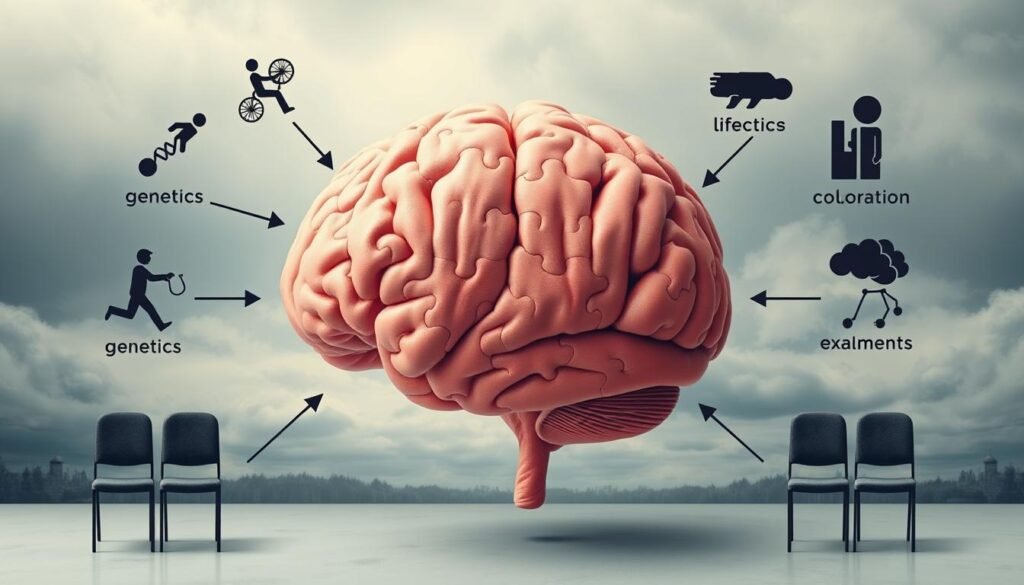Did you know that about 1% to 3% of older adults face dementia yearly? This fact highlights the growing need for awareness about cognitive decline and dementia. Alzheimer’s Disease, in particular, affects millions as we get older.
Memory loss and other brain health issues are becoming more common. It’s important to understand how cognitive abilities can change.
After 65, the chances of getting dementia double every five years. It’s key for everyone – individuals, families, and caregivers – to know about these conditions. Also, 10% to 15% of people with Mild Cognitive Impairment (MCI) develop dementia each year. This underlines the need for early spotting and acting.
We’ll look into what cognitive decline and dementia are, including their signs, reasons, and how to manage them. This information is crucial for dealing with the challenges of aging on our mental capabilities.
Key Takeaways
- Cognitive decline affects 1% to 3% of older adults annually.
- 10% to 15% of those with Mild Cognitive Impairment progress to dementia each year.
- The risk of dementia doubles every five years after age 65.
- Genetic and lifestyle factors significantly influence the risk of MCI and dementia.
- Alzheimer’s disease remains a leading cause of death in the U.S.
Introduction to Cognitive Decline and Dementia
Cognitive decline involves a slow loss of thinking, memory, and reasoning skills. It can result in major mental issues, affecting someone’s everyday life and happiness. This condition varies, from being slightly forgetful to having serious cognitive problems linked with diseases like dementia.
Dementia is a severe form of cognitive decline. It’s marked by ongoing drops in thinking abilities. This leads to big problems, especially with memory and solving issues. Alzheimer’s disease is the most common dementia type, with others like vascular and mixed dementia following.
It’s important to know the difference between cognitive decline and dementia. That’s because more and more people in the U.S. are facing these issues. Many deal with cognitive issues that aren’t as severe as dementia. Understanding these conditions helps support those who are affected.
Cognitive decline and dementia deeply impact individuals and their families. With an aging population, the need for awareness and action is rising. This makes it crucial to work on early detection, prevention, and ways to improve mental health and life quality.
Defining Cognitive Decline
Cognitive decline includes a slow drop in mental skills like memory, thinking, and problem-solving. It can be hard to tell apart from normal aging. While it’s normal to be a bit forgetful with age, a big drop in these skills can make daily tasks tough.
Age plays a big role in cognitive decline. Our peak thinking abilities hit around age 30 and gently go down after that. Changes in the brain, like smaller areas in the hippocampus and frontal lobes, play a part in this decline. However, some skills like vocabulary may actually get better as we age. It’s key to know these details when checking someone’s mental skills.
Symptoms of cognitive decline show up as clear forgetfulness, especially of recent things or important dates. Clinical cases show us how hard everyday duties get, pointing to more than just normal memory loss. It’s vital for people and caregivers to spot these signs early. Quick action may help improve the situation. For a deeper look at Mild Cognitive Impairment (MCI), which is between normal aging and dementia, this resource has great info.
A quick look at conditions related to cognitive decline helps show the differences and issues that come up:
| Condition | Description | Critically Affected Areas |
|---|---|---|
| Normal Aging | Minor forgetfulness, stable vocabulary. | Some cognitive functions. |
| Cognitive Decline | Gradual decrease in memory and reasoning. | Everyday tasks, memory recall. |
| Mild Cognitive Impairment (MCI) | Noticeable memory problems, potential for dementia. | Memory, reasoning, attention. |
It’s crucial to identify cognitive decline early for effective help and support. Knowing the signs leads to action that can better life and brain health. Catching memory and thinking changes early means getting the right medical help and possibly treatments to tackle the root problems.
Understanding Dementia as a Neurocognitive Disorder
Dementia is a key example of a neurocognitive disorder. It changes memory, thinking, and social skills enough to impact daily life. It’s divided into two types: major neurocognitive disorder, often called dementia, and mild neurocognitive disorder, known as mild cognitive impairment.
Major vs. Mild Neurocognitive Disorder
Mild neurocognitive disorder means a slight drop in thinking skills. People can still do their daily tasks on their own. But, major neurocognitive disorder, or dementia, causes a big loss in mental capabilities. This makes it hard for people to do everyday activities.
These disorders can come from brain injuries, diseases like Alzheimer’s, and other health problems. The worsening of major neurocognitive disorders costs families and the healthcare system a lot, both in money and in emotions.
Common Symptoms of Dementia
Early signs of dementia start small but get worse. They affect day-to-day life. People with dementia may have:
- Memory loss that disrupts daily life
- Difficulty in communicating or finding words
- Problems with spatial orientation and understanding visual images
- Impaired judgment and reasoning
- Changes in mood and personality
As dementia gets worse, individuals may become agitated and confused. They suffer long-term brain function loss. To diagnose dementia, doctors use blood tests, neuropsychological tests, and imaging. Around 47 million people worldwide live with dementia. Knowing about it helps in managing the condition for patients and their families.
Cognitive Decline and Dementia: Causes and Risk Factors
Cognitive decline and dementia come from many causes and risk factors. Lifestyle choices impact these risks. Knowing these factors helps us understand how to lower the risk of Alzheimer’s Disease and other dementias.
Age and Genetic Predisposition
Age is the biggest risk factor for dementia. The chance of experiencing cognitive decline grows after 65. Genetics are also key; the APOE gene variant increases Alzheimer’s Disease risk. Having a family member with dementia raises your risk too.
Medical Conditions and Lifestyle Factors
Several medical and lifestyle factors can lead to cognitive decline and dementia. High blood pressure, diabetes, and being overweight make the risk go up. Eating well and staying active are essential. A diet full of fruits, whole grains, and nuts helps your brain. But, too much alcohol and smoking can increase your dementia risk.
| Risk Factor | Influence on Cognitive Decline |
|---|---|
| Age (65+) | Significantly increases risk |
| Genetics (APOE e4) | Increased susceptibility to Alzheimer’s Disease |
| High blood pressure | Linked to cognitive dysfunction |
| Diabetes | Elevated risk of dementia-related symptoms |
| Obesity | Increases likelihood of cognitive decline |
| Physical Inactivity | Correlates with higher dementia risk |
| Unhealthy Diet | May accelerate cognitive impairment |
| Smoking | Higher dementia risk compared to non-smokers |

Mild Cognitive Impairment (MCI) and Its Significance
Mild Cognitive Impairment (MCI) is a key stage in brain health. It sits between normal aging and dementia. Individuals with MCI notice differences in how they think, which can affect daily life. It’s crucial to spot these changes early. Doing so helps in managing the condition before it gets worse.
Symptoms of Mild Cognitive Impairment
People with MCI have symptoms that show it’s not just aging. These include:
- Memory Loss: Being forgetful, especially about recent happenings or talks.
- Difficulty in Decision-Making: Having trouble with planning or doing tasks.
- Language Issues: Struggling to find the correct words when talking.
- Disorientation: Forgetting the location of well-known places.
These issues may disrupt daily life. This leads to worries about cognitive health in individuals and their families. Studies show that 12% to 18% of people over 60 have MCI.
Prognosis and Progression to Dementia
Many people with MCI may eventually develop dementia. Every year, 10% to 15% of those with MCI get a dementia diagnosis. The likelihood of this happening depends on age and the severity of cognitive issues. The risk is higher for those with problems in several areas of thinking, known as multidomain MCI.
A person who is 90 with MCI has a higher chance of getting dementia than someone who is 70. Often, those who move from MCI to dementia see their symptoms slowly get worse. Knowing these risks helps individuals and their supporters to find the right help and support.
| Age Group | Percentage with MCI | Annual Progression to Dementia (%) |
|---|---|---|
| 60 years and older | 12% – 18% | 10% – 15% |
| 70 years and older | 14% (with dementia) | Higher risk based on age |
| Multidomain MCI | N/A | Significantly higher risk |
The Impact of Alzheimer’s Disease
Alzheimer’s Disease is the leading cause of dementia, making up 60% to 70% of cases. It mainly impacts older adults, affecting memory, thinking, and daily tasks. Knowing the effects of Alzheimer’s is vital for families, caregivers, and health systems.
Overview of Alzheimer’s Disease
Alzheimer’s is a brain disorder that leads to memory loss and cognitive decline. It is linked to over 80 genes. Notably, genes like APP, PSEN1, and PSEN2 are involved. People with Down syndrome are also at high risk, with many developing Alzheimer’s by their 50s or 60s.
Statistics and Prevalence
Alzheimer’s disease has a significant impact, especially in the United States:
| Statistic | Value |
|---|---|
| People aged 65 and older living with Alzheimer’s | Approximately 6.9 million |
| Alzheimer’s Disease as a leading cause of death in the U.S. | Seventh leading cause |
| Percentage of dementia cases attributed to Alzheimer’s | 60% to 70% |
| New diagnoses per 1,000 individuals aged 65-74 | Four |
| New diagnoses per 1,000 aged 75-84 | 32 |
| New diagnoses per 1,000 individuals aged 85 and older | 76 |
| Global dementia cases in 2019 | Over 55 million |
| Global cost of dementia care | Approximately US$1.3 trillion |
The cost and emotional impact of Alzheimer’s affect more than just families. By understanding its prevalence, we can offer better support and resources. This enables a more caring and informed approach to addressing cognitive decline and dementia.

Understanding Brain Aging and Its Effects
Brain aging changes how we think and remember things. Older people might find it harder to pay attention for long. But, they usually know more words and what they mean than younger folks do.
With age, some brain areas shrink. These areas are important for learning and solving problems. This can affect overall brain health. Also, older people’s brains don’t get as much blood flow, which can impact thinking skills.
Living a healthy life can make a big difference. It can cut the risk of diseases like Alzheimer’s by up to 60%. Being active, not smoking, eating well, and keeping the brain busy are key. Even doing just a few of these can lower the risk by almost 37%.
There’s still hope as we age, though. New studies show that adults can still grow new brain cells. Our brains can adapt, despite losing some cells and connections. This helps us keep our brains working well.
It’s important to understand how our genes, environment, and lifestyle choices affect our brain. Making good choices, staying positive, and sleeping well can help our brains stay strong. Getting enough sleep is especially crucial for mental health.
Bad habits and health issues in midlife can speed up brain aging. This increases the risk of Alzheimer’s. Not sleeping enough can lead to changes in the body that harm the brain.
| Factor | Impact on Brain Aging |
|---|---|
| Mild Attention Decline | Lower focus capacity |
| Vocab Growth | Larger vocabulary, deeper word understanding |
| Structural Brain Changes | Shrinkage of learning-related areas |
| Blood Flow Decrease | Potential cognitive impact |
| Healthy Lifestyle | Reduces Alzheimer’s risk up to 60% |
| Neurogenesis | New neurons form in adulthood |
| Risk Factors | Accelerated age-related cognitive decline |
Diagnosis and Assessment of Cognitive Decline
Accurate diagnosis and timely assessment of cognitive issues are essential. They are key in managing conditions like dementia and Mild Cognitive Impairment. Knowing the diagnostic criteria and using the right tools is vital for good patient care.
Diagnosis Criteria for Dementia and MCI
The Diagnosis of Dementia and Mild Cognitive Impairment mainly uses criteria from the DSM-5. Spotting changes in memory or thinking skills is the first step. For Mild Cognitive Impairment, the signs include:
- Noticing changes in memory or thinking.
- Seeing these abilities decline over time. Yet, not severely affecting daily life.
- Small changes in mental function related to the person’s age and education level.
Doctors conduct thorough neurological exams too. They check reflexes, eye movements, and balance. Doing this helps them rule out conditions like strokes or Parkinson’s disease.
Tools and Techniques for Cognitive Assessment
Different methods help assess cognitive health, including brain scans like MRI, CT scans, and PET scans. These can identify problems such as tumors or strokes. Blood tests also play a role. They help exclude causes of memory issues like vitamin B-12 or thyroid hormone deficiencies.
The Mini-Cog is a brief test often used in clinics to check for cognitive problems. The FDA has approved digital tools too, such as the ANAM and CANTAB Mobile®. Plus, resources like ALZConnected® and ALZNavigator™ are available for those dealing with memory loss.
In conclusion, understanding and effectively using diagnostic tools is crucial. It leads to prompt care and specific strategies for those with cognitive decline.
Treatment Options and Management Strategies
The treatment of dementia uses different methods to help those affected. These methods include medicines and non-medicine approaches. They aim to manage symptoms and make life better for people with cognitive decline. Understanding these options helps caregivers and families support their loved ones better.
Medications for Symptom Management
Medicines play a key role in treating dementia, mainly by easing symptoms. Here are some important ones:
- Cholinesterase inhibitors: Drugs like donepezil, rivastigmine, and galantamine boost neurotransmitters tied to memory and learning.
- Memantine: This medication helps control severe Alzheimer’s symptoms. It does this by adjusting brain glutamate levels.
- Clinical trials: Recent studies on lecanemab and donanemab show they may slow cognitive decline in early Alzheimer’s.
Non-Pharmacological Interventions
Along with medicines, non-drug strategies play a part in dementia care. They support brain health in various ways:
- Cognitive therapies: Engaging the brain with puzzles and memory exercises can improve cognitive function.
- Physical activities: Regular physical exercise helps overall health and may slow down the loss of cognitive abilities. It improves strength and balance too.
- Engaging activities: Enjoying activities like painting, gardening, and dancing builds social connections and stimulates the mind.
- Alternative therapies: Techniques like music therapy, pet therapy, and aromatherapy can ease unease and bring calm.
Combining medicines with non-drug interventions helps manage cognitive decline effectively. The main goal is to improve the general wellbeing of people living with dementia. This ensures everyone receives caring and all-encompassing care.
| Type of Intervention | Examples | Benefits |
|---|---|---|
| Medications | Donepezil, Memantine | Manage symptoms, improve cognitive function |
| Therapies | Cognitive behavioral therapy, occupational therapy | Enhance mental engagement, provide coping strategies |
| Physical Activities | Walking, dancing | Boost physical health, improve mood |
| Alternative Therapies | Music therapy, pet therapy | Reduce anxiety, foster emotional connections |
Prevention Strategies for Cognitive Decline
Preventing cognitive decline is crucial as dementia cases worldwide surpass 55 million. Lifestyle changes can greatly reduce memory loss risks. By adopting preventative approaches, we can better our brain health over time.
Lifestyle Modifications
Research highlights how lifestyle choices affect our brain. Activities like regular aerobic exercise can boost brain function and cut dementia risk. The World Health Organization advises that people over 65 should do moderate aerobic exercise for 150 minutes weekly. This effort could prevent up to 40% of dementia cases, showing the importance of lifestyle changes.
- Physical Activity: 150 minutes of aerobic exercise a week can sharpen memory, aiding those with mild cognitive impairment (MCI).
- Sleep Hygiene: Good sleep habits can tackle insomnia, linked to cognitive decline. Avoiding screens and caffeine at night helps. Learn more here.
- Nutrition: Eating foods rich in antioxidants and healthy fats boosts brain health. Include fish, nuts, and berries in your diet.
Importance of Social Interaction and Mental Stimulation
Social activities and friendships play a key role in keeping our brains healthy. Being part of a community or doing group activities offers mental exercise. Solving puzzles or cognitive training also sharpens the brain, aiding in dementia prevention.
As memory loss cases rise, adopting these lifestyle changes and staying social is crucial. There’s no single solution, but our actions can significantly help.

Conclusion
Understanding cognitive decline and dementia is important. Awareness and early diagnosis are key. Around 4.2 million adults in the U.S. were living with dementia in 2010. Experts think this number might triple by 2050.
It’s vital to focus on brain health to lower risks. For example, physical activity and getting more education can help. Education especially can reduce the risk of dementia. This shows how critical it is to make education available to more people.
Research is finding ways to manage blood pressure and brain training. But we need to know more about their long-term effects. Being active helps slow down losing brain power. Yet, we’re still figuring out how much it helps. For more details, check out this study.
There’s a lot that affects our brain health. So, we need to keep researching. Using medicine, changing our lifestyle, and education together might help prevent problems. If we take care of our brain health and support each other, we can fight cognitive decline and dementia.